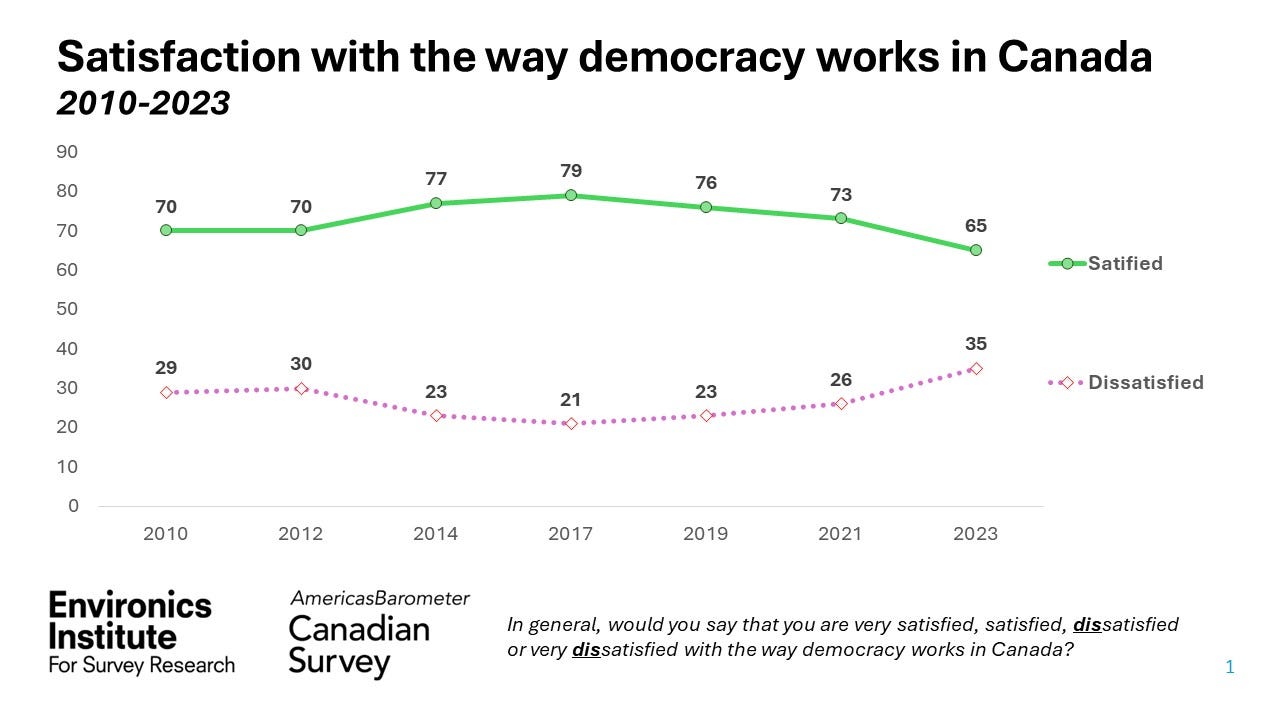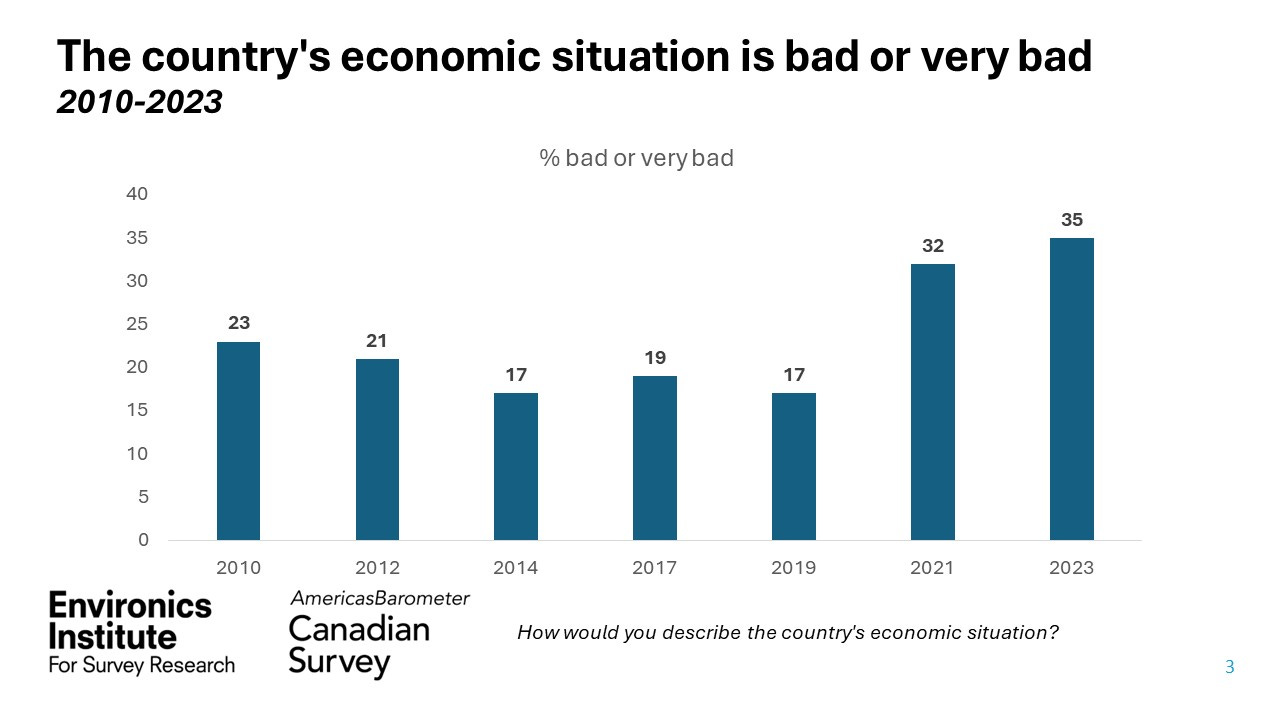Why is satisfaction with democracy falling?
Fewer Canadians are satisfied with the way democracy works in this country; but why?
This week, the Environics Institute published a report showing that the level of satisfaction with the way democracy works in Canada is falling. What explains this drop in satisfaction? How worried should we be?
Here are the key figures:
Two in three Canadians (65%) say they are very satisfied or satisfied with the way democracy works in this country.
While the overall level of satisfaction increased in the middle part of the last decade, it has declined since then, and is currently lower than at any time since this current series of surveys began in 2010.
The current level of satisfaction is 14 percentage points lower than the peak of 79 percent reached in 2017; satisfaction also fell by eight points in the most recent period (between 2021 and 2023).
These days, most of us could easily come up with a long list of complaints about the way our political system is working. That said, there is a good chance that the public’s view on democracy is simply reflecting the mood about the economy.
The report highlights these two additional findings.
First, satisfaction with democracy in Canada differs significantly between those who think the economy doing well, and those who think it is doing badly. In 2023, for instance, 87 percent of those who describe the country's economic situation as very good or good are satisfied with the way democracy works in Canada, compared with only 42 percent of those who describe the economy as bad or very bad.
Second, there has been a big change in recent years in the assessment of the economy. The proportion of Canadians who say the country’s economic situation is bad or very bad doubled between 2019 (17%) and 2023 (35%).
It seems that much of the decline in satisfaction with democracy in Canada can be accounted for by this shift in the assessment of the country's economic situation. Simply put, people who think the economy is doing badly are less likely to be satisfied with democracy, and the proportion with this negative assessment of the economy is growing.
The finding that the recent decline in overall satisfaction with democracy in Canada coincides with growing concern about the economy – at a time of higher inflation and interest rates – does not mean it’s not important. Lower overall support for democracy remains a cause for concern (it could, for instance, make it harder to maintain broad public acceptance of the outcomes of political decision-making).
But it is also worth keeping in mind that it may mostly be a function of the regular ups and downs of the economic cycle, and not some wider crisis presaging a swing towards support for authoritarian politics.
The key question that remains is whether satisfaction with democracy will rebound quickly with an improvement in the economic environment. We’ll do our best to let you know.
The data presented in this post are from the Canadian portion of the 2023 AmericasBarometer. The AmericasBarometer is a biennial comparative survey of democratic values and behaviours that covers countries in North, Central and South America, as well as a significant number of countries in the Caribbean (the 2023 survey covers 25 countries). The project is led by the Latin American Public Opinion Project (LAPOP) at Vanderbilt University.
The survey is the most comprehensive source of information about support for democracy in Canada. Follow the Environics Institute to catch more reports from this survey.
The 2023 AmericasBarometer in Canada survey was conducted by the Environics Institute for Survey Research, in partnership with LAPOP at Vanderbilt University. It was conducted online with a representative sample of 2,500 Canadians (aged 18 and over) between July 20 and August 4, 2023. The author is solely responsible for any errors of presentation or interpretation.
What is the Environics Institute for Survey Research? Find out by clicking here.
Follow us on other platforms:
· Twitter: @Environics_Inst or @parkinac
· Instagram and Threads: environics.institute






The reason I personally am disappointed with the state of democracy in Canada is biased media which doesn’t hold the government to account. The judiciary that has dismissed most of the Covid cases as moot, the reason they are moot is because the courts are so backed up they couldn’t bring the cases forward in a timely manner. The unequal way protestors are treated, for example it was perfectly fine to shut down rail lines before Covid but freedom convoy protestors were arrested and have been in jail without bail for long periods of time, and real dangerous repeat criminals are let out on bail in hours. The ongoing pro-Hamas rallies that target hospitals ( hospitals were off limits during Covid). Let’s see, what else, oh right, 3 cities determine who gets to hold power in the elections. We elected a minority government but the NDP have co-opted the will of the people and let the liberals rule as a majority. I am sure there is much more I am forgetting. This article is ridiculous. Of course the economy makes people discontent but there are many many more things in this country that are i democratic. Oh yes, the upcoming bill C-63, and bill C-11 and bill C-18. And who voted for carbon taxes or a moratorium on gas powered vehicles or a net zero grid or to shut down oil and gas? 70% of Canadians voted against this government but we got them anyway. Is this democratic?????
I wonder if the answers people provide to the questions asked is a function of how they actually feel about the question subject matter or if they are just reflecting the opinions they have been exposed to in one sort of medium or another. Canadians who use Fox or The Rebel as their primary news sources watered copiously through their SM silos are going to respond differently than those who get their news from The Star or CBC and have those slants watered via their SM.
Any data collection needs to test for media bias or is useless and the results of an election will surprise the pundits, the media and the Parties as the results fail to reflect the polls.